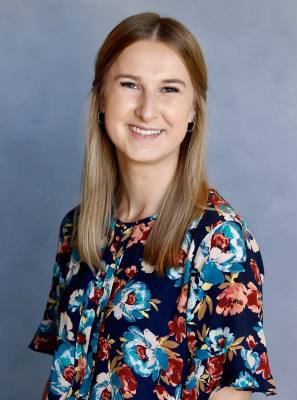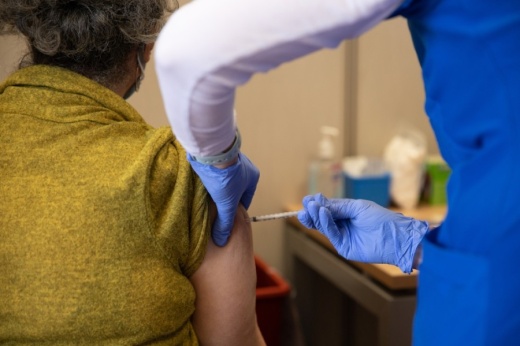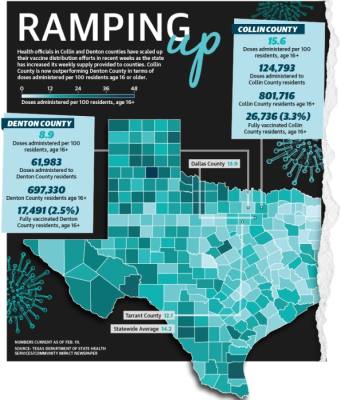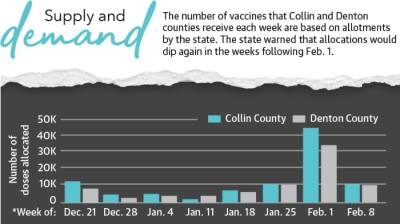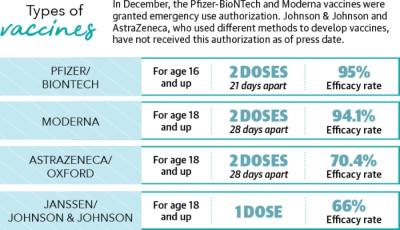Demand for the vaccine in Collin and Denton counties far surpasses the number of doses either county has received. And that estimated demand is based only on those eligible for early phases of vaccination.
“It’s not a matter of desire,” Plano's City Manager Mark Israelson said. “It’s a matter of supply that we’re working through ... And we want it [the process] to be as safe and as efficient as we can possibly make it.”
In the early stages of vaccine distribution, Collin and Denton counties received fewer vaccines in proportion to their populations than other counties.
The counties’ health departments and local leaders have pushed for equitable and clear standards for vaccine distribution. But a return to normalcy may take longer than initially anticipated, city and county officials shared.
The Texas Department of State Health Services does not expect the vaccine to be available for most Texans until late spring or early summer 2021, Collin County Judge Chris Hill said in an email. But Collin County is ready to increase vaccinations as they become available, Hill said.
Collaborating with the county
In an effort to make vaccinations more accessible to residents, the city of Plano entered into two public-private partnerships that created vaccination sites at the city’s Sam Johnson Recreation Center for Adults 50+ and Plano ISD’s John Clark Stadium. Both sites operate off Collin County’s vaccination waitlist and receive state-allotted doses through Collin County Healthcare Services.
The Sam Johnson site opened Feb. 2 and is contracted for six months of vaccine distribution, Israelson shared during a January City Council meeting. The recreation center has been closed to the public, with the exception of its health care clinic, since March of last year.
The site is run by health care company Texas Health Resources and operates slightly differently than drive-thru locations, Israelson said. Those receiving vaccines are required to park and enter the building.
In its first week, the center vaccinated close to 200 people each day. That number is expected to go up as more vaccines become available, site manager Paula Miller said.
Plano resident Connie Cordova received her first dose of the Pfizer vaccine Feb. 5. She said she found the process went smoothly.
"I was so impressed and pleasantly surprised,” Cordova said.
The hub at John Clark Stadium has faced some logistical issues since opening. This once caused an early closure on Feb. 4 due to traffic backups, dwindling daylight and people showing up without appointments, said Miranda Gottlieb, vice president of marketing with Curative, the company that runs the site.
The latter issue has been common across the county, Commissioner Duncan Webb shared during a Feb. 2 Plano Chamber of Commerce vaccination update.
“You['ve] got to remember all the sites ... are by appointment only,” Webb said.
Ongoing changes at the Curative site include the creation of additional drive-thru lanes for faster vaccinations as well as a more efficient registration process, a company representative shared via email. The company expects to be able to distribute 6,000 vaccines daily—the amount Collin County asked for from the state for each hub—as additional staff is hired and software adjustments are made, the representative said.
Curative is currently contracted to work at John Clark Stadium until April 27, although there is potential for an extension, the email said.
Collin County’s additional vaccination hubs are in Frisco, McKinney and Allen.
In Denton County, the public health department’s primary vaccination location initially rotated in an effort to provide equitable access to the vaccine. On Feb. 2, the county opened a more stationary vaccination clinic at Texas Motor Speedway in north Fort Worth.
As more vaccine hubs open in the area, Plano Media Relations Director Steve Stoler urged residents to pay attention to communications from counties and their hubs so as not to go to the wrong location.
It’s also important for those vaccinated to return to the same location for their second dose, Miller said. This should assure that the same vaccine brand is available, she said.
The process of distributing COVID-19 shots in North Texas was most recently slowed by dangerous weather and power outages across the state, which delayed vaccine site openings the week of Feb. 8 and closed many through the week of Feb. 15.
At Collin County’s Plano ISD John Clark Stadium, rescheduling began the Monday following the winter storms, according to Collin County public information officer Tim Wyatt. No vials went bad for any reason during closures, as the vaccine freezers have backup generators, Wyatt said in an email.
The site is confident in its ability to continue to administer first doses while it catches up on delayed second doses, Judge Hill said at a Feb. 22 Collin County Commissioners meeting.
Denton County's Texas Motor Speedway vaccination site reopened Feb. 24. Second doses are taking priority at the hub for the remainder of the week Denton County health officials said.
Fighting for equity
Another one of the ways the city of Plano has tried to make vaccinations more readily available for residents is through the passage of a Jan. 29 resolution calling for equitable distribution.
A “unified public declaration” gives further “ammo” for legislators and local leadership to continue working with the state for fair distribution, Deputy Mayor Pro Tem Anthony Ricciardelli said.
The state recognized the issue of allocations in Dallas-Fort Worth suburban areas being “significantly less than their share of the population” in a Jan. 29 release. The state moved to send an influx of doses to affected areas for the week of Feb. 1. But it has already notified Collin and Denton counties that this was a one-time increase until more vaccines are available from manufacturers.
Collin County decided Feb. 8 to temporarily pause processing new registrations on the county’s online waitlist due to an imbalance of available doses and demand for them.
The city is encouraging residents to sign up for several waitlists to see which one might take them first, Israelson said. This can include any county or private waitlist, as vaccine distribution is not restricted based on residency, he said.
Some pharmacies are expected to offer vaccines in the near future as well. A Plano CVS location began offering vaccines through a federal allotment program the week of Feb. 8, along with other CVS, Sam's Club, Walmart and local pharmacies across the state.
Slowing the spread
City staff are working to educate those who are hesitant to get vaccinated by sharing information on possible reactions to the vaccine—which, so far, have largely proven to be mild, such as arm soreness and fatigue—as well as the most recent data on the benefits of avoiding a COVID-19 infection, Deputy City Manager Greg Rushin said at the Feb. 2 chamber update.
The city is also encouraging residents to help minimize community spread by continuing to wear masks and social distance. This is especially true now that many will likely not receive the vaccine until late spring or early summer, he said.
“The city’s role is to do all we can to allow every citizen who wants a vaccine to get one,” Rushin said. “Part of that is educating our citizens, so they can make the decision that’s best for them considering their individual circumstances.”
Cordova never had any doubt in her mind about getting the COVID-19 vaccine when she went to the recreation center for her first dose, she said.
A survivor of breast cancer and a heart attack, she said she does not intend to let coronavirus stop her either.
“I’m gonna have to take care of this one, too,” Cordova said.


